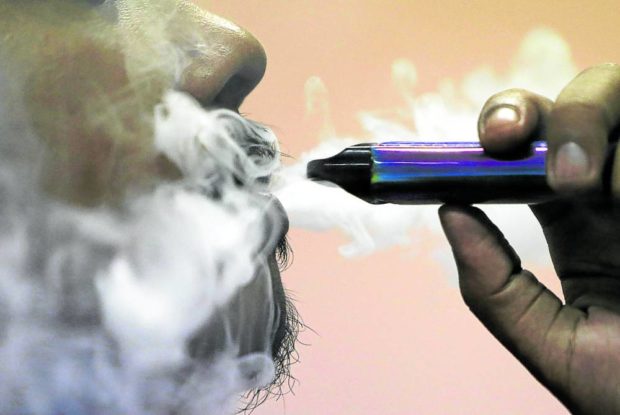Vapers in indoor public spaces face fine of P5,000 to P20,000

INQUIRER FILE PHOTO
MANILA, Philippines — Hefty penalties ranging from P5,000 to P20,000 await smokers who will be caught using vapes in indoor public spaces, including government offices, schools, airports, and churches.
The Department of Trade and Industry (DTI) released on Thursday a department administrative order promulgating the implementing rules and regulations (IRR) for Republic Act No. 11900, or the Vaporized Nicotine and Non-Nicotine Products Regulation Act.
The IRR also sets the minimum allowable age for the purchase, sale or use of vapes to 18 years old, which critics of the law earlier warned would expand the vaping market to include more young people of the senior high school age.
According to Department of Education (DepEd) figures, some 1.1 million students were in the 18-to-20 age bracket during school year 2020-2021, and “this is the number of learners who will become legally allowed to be marketed the harmful products” under the vape law, a DepEd statement opposing the measure had warned.
The IRR will take effect 15 days after its publication in the Official Gazette or in at least two newspapers of general circulation.
Article continues after this advertisementPublic spaces
Rule VIII of the IRR said that the use of vaporized and non-nicotine products will be prohibited in all indoor public spaces, except in designated vaping areas or in point-of-sale establishments for purposes of conducting product demonstrations.
Article continues after this advertisementIn the case of mall kiosks, vape product demonstrations will be allowed in designated product-testing areas.
Public places where vaping is prohibited include centers of youth activity such as playschools, preparatory to high schools, colleges, universities, youth hostels, and recreational facilities for people under 18 years old.
The IRR also includes elevators and stairwells, as well as gas stations as nonvaping areas.
Buildings and premises of public and private hospitals, medical, dental and optical clinics, health centers, nursing homes, dispensaries, and laboratories are also considered public spaces.
Public conveyances and public facilities such as airport and ship terminals, train and bus stations, restaurants, conference halls, churches and other similar places of worship, and buildings and premises of government offices are likewise on the list.
First-time offenders will be fined P5,000, while those caught vaping in indoor public spaces the second time will need to cough up P10,000.
Penalties
A fine of P20,000 will be meted out for the third offense.
Erring vape business entities or establishments also risk the revocation or cancellation of their business permits.
Establishments and retailers selling to minors will be penalized with a P10,000 fine or imprisonment of 30 days or less upon the discretion of the court on the first offense.
Succeeding offenses will have the same fines but business establishments involved will have their licenses or permits revoked.
Both brick-and-mortar stores and online traders are also required to register with the government to sell vape products.
Violators of this requirement will be fined P100,000 on the first offense and P200,000 on the second.
Third-time violators will face a penalty of P400,000, as well as revocation of their business permits.
Manufacturers, importers, distributors or retailers found violating the requirements on product packaging, which mandates the inclusion of health warnings, face fines ranging from P2 million to P5 million, as well as imprisonment of two to six years.
Health concerns
RA 11900, or the Vaporized Nicotine and Non-Nicotine Products Regulation Act, lapsed into law last July 25 after it was not signed or vetoed by the President 30 days after receiving the document.
Ratified last January by the Senate and the House in the previous Congress, it is seen to have wide health and trade implications in the Philippines, where an estimated 16.6 million adult Filipinos use tobacco, according to the Department of Health (DOH).
Mr. Marcos’ decision to allow the vape bill to lapse into law had dismayed its critics. Sen. Pia Cayetano, a public health advocate and a staunch opponent of the bill, pinned much of the blame on her colleagues in the previous administration.
“To say that I am disappointed in the 18th Congress that passed the bill, and with the President for not vetoing it, will not do justice to the millions of lives that will be put in harm’s way because of the vape law,” she said.
During Senate deliberations, the bill was sponsored by former Senate President Pro Tempore and now Batangas Rep. Ralph Recto.
The new law gave the DTI regulatory jurisdiction over vapes and other novel tobacco products, instead of the Food and Drug Administration (FDA), which earlier insisted it was “the rightful authority, possessing the expertise, competencies and manpower to develop standards, to regulate and monitor novel tobacco products.”
The FDA, the DOH, and DepEd had all urged the President to veto the measure.
Mandatory certification
Earlier, the Bureau of Philippine Standards (BPS), an attached agency of the DTI, included vapes and heated tobacco products (HTPs) in the list of consumer goods subject to mandatory certification to ensure they conform to the Philippine National Standards.
Under DTI Department Administrative Order No. 22-06, Series of 2022, electronic cigarettes and e-liquids as well as HTPs and electrical tobacco heating devices, will be subject to mandatory certification beginning Jan. 4, 2024.
The inclusion of e-cigarettes and HTPs in the list of consumer goods subject to mandatory certification would ensure the quality of these products and prevent illicit trade, according to the DTI.
The BPS said the mandatory certification would cover both the devices and the systems, which include the e-liquid when it comes to electronic cigarettes.
Before the mandatory certification takes effect in 2024, “importers and manufacturers can voluntarily apply for the Philippine Standard mark or Import Commodity Clearance,” the BPS said.